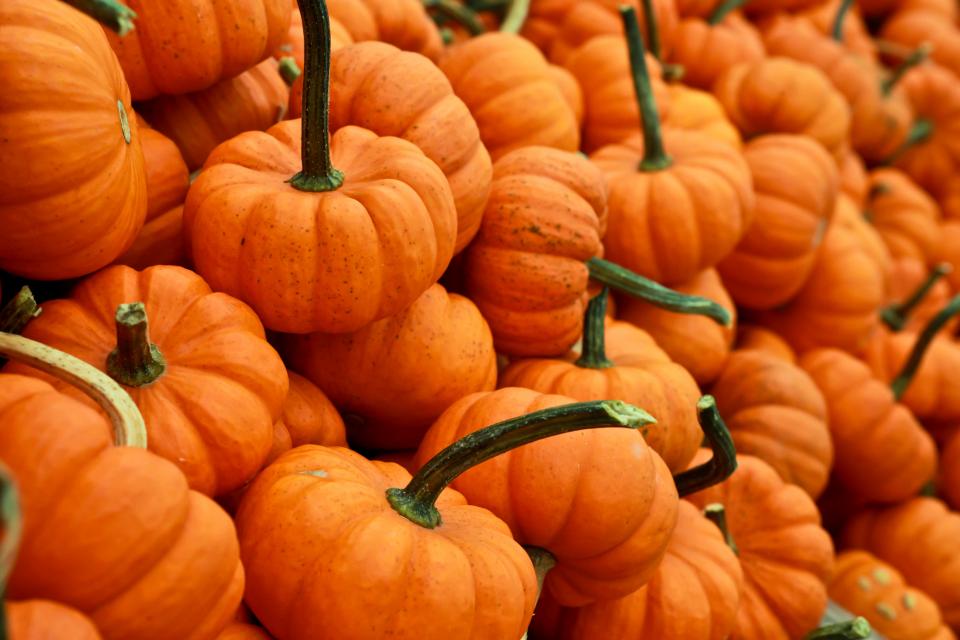This article explores the question of whether dogs can eat pumpkin and dives deep into its potential health benefits and safety considerations. We'll discuss the different types of pumpkin suitable for canine consumption, the ideal serving size, and how to safely incorporate pumpkin into your dog's diet. We'll also cover the potential risks and side effects associated with pumpkin consumption and address common FAQs regarding this popular canine treat.
Part 1: Understanding Pumpkin and its Benefits for Dogs

1.1 Pumpkin: A Versatile Treat
Pumpkin, a member of the squash family, offers a range of nutritional benefits for humans and canines alike. Its versatility makes it a popular addition to various dishes, from hearty soups and comforting pies to refreshing smoothies and healthy snacks.
1.2 Types of Pumpkin for Dogs
When choosing pumpkin for your dog, it's essential to understand the differences between various types:
1.2.1 Canned Pumpkin
Canned pumpkin puree, often labelled as "100% pumpkin" and found in the baking aisle, is the most common type used for dogs. Ensure it is plain pumpkin puree and does not contain any added sugar, spices, or preservatives. Look for brands that are free from artificial ingredients and additives.
1.2.2 Fresh Pumpkin
Fresh pumpkin, available during the autumn season, can be cooked and mashed for your dog. Roasting the pumpkin enhances its flavour and digestibility. Choose pumpkins that are firm and free from bruises or soft spots. When roasting, ensure the pumpkin is thoroughly cooked through to prevent any digestive issues.
1.2.3 Pumpkin Seeds
Pumpkin seeds, a rich source of protein, fibre, and healthy fats, can be a nutritious treat for dogs. Ensure the seeds are roasted and unsalted for safe consumption. You can purchase pre-roasted pumpkin seeds or roast them at home in a low oven. Be cautious of potential choking hazards with larger seeds and consider breaking them into smaller pieces before feeding them to your dog.
1.3 Nutritional Profile of Pumpkin
Pumpkin is a treasure trove of various nutrients that benefit dogs, including:
- Fibre: Pumpkin is an excellent source of both soluble and insoluble fibre, which plays a crucial role in aiding digestion and promoting regular bowel movements. Soluble fibre helps absorb water in the digestive tract, forming a gel-like substance that slows down digestion and adds bulk to stools. Insoluble fibre adds bulk to stools and helps them move through the digestive tract more easily. This makes pumpkin particularly helpful for dogs with constipation or diarrhoea.
- Vitamins: Pumpkin is rich in vitamins A, C, and E, which are vital for maintaining good health. Vitamin A supports healthy vision, immune function, and skin health. Vitamin C is an antioxidant that helps boost the immune system and promotes wound healing. Vitamin E is another antioxidant that helps protect cells from damage caused by free radicals. These vitamins contribute to overall well-being and contribute to a healthy immune system and healthy skin and coat.
- Minerals: Pumpkin contains essential minerals like potassium, magnesium, and zinc, which play crucial roles in various bodily functions. Potassium helps regulate fluid balance and muscle contractions. Magnesium is essential for bone health, energy production, and nerve function. Zinc is important for immune function, wound healing, and cell growth. These minerals work together to support a healthy body and optimal functioning.
- Antioxidants: Pumpkin is packed with antioxidants, such as carotenoids and vitamin C, which help protect cells from damage caused by free radicals and reduce inflammation. Antioxidants contribute to overall health and disease prevention.
Part 2: Benefits of Pumpkin for Dogs

2.1 Digestive Support
Pumpkin's high fibre content acts as a natural digestive aid, adding bulk to stools and promoting regular bowel movements. It can be particularly beneficial for dogs experiencing constipation, as it helps soften stools and make them easier to pass. Pumpkin can also help regulate diarrhoea by absorbing excess water in the digestive tract.
2.2 Weight Management
Pumpkin is relatively low in calories and high in fibre, making it a filling and satisfying treat for weight-conscious dogs. The fibre content promotes satiety, helping dogs feel full for longer, reducing the urge to overeat. It can be incorporated into a balanced diet as part of a weight management plan.
2.3 Urinary Tract Health
Pumpkin is a natural source of fibre and antioxidants, which can help prevent urinary tract infections (UTIs) in dogs. The fibre helps flush out bacteria, while antioxidants combat inflammation. However, it's important to note that pumpkin alone cannot cure UTIs and should be used as part of a comprehensive approach to managing urinary health.
2.4 Skin and Coat Health
The vitamins A, C, and E found in pumpkin support healthy skin and coat growth. These vitamins promote collagen production, which contributes to skin elasticity and strength. They also help reduce dryness and flakiness, leading to a softer, shinier coat.
2.5 Immune System Boost
Pumpkin's antioxidants help strengthen the immune system by protecting cells from damage and reducing inflammation. This can help dogs fight off infections and maintain overall health. A healthy immune system is essential for warding off illnesses and promoting overall well-being.
Part 3: How to Feed Pumpkin to Your Dog

3.1 Serving Size and Frequency
The appropriate serving size of pumpkin for your dog depends on their size, breed, and activity level. Generally, a small teaspoon to a tablespoon per day is a safe starting point. Always consult your veterinarian for personalized recommendations based on your dog's specific needs. It's essential to start with a small amount and gradually increase the serving size over time to avoid any digestive upset.
3.2 Incorporating Pumpkin into Your Dog's Diet
Pumpkin can be incorporated into your dog's diet in various ways:
3.2.1 Topping for Dog Food
Add a teaspoon or two of plain canned pumpkin to your dog's kibble or wet food for added flavour and nutrients. It can be sprinkled over the food or mixed in for a more uniform distribution.
3.2.2 Treats
You can bake homemade treats using pumpkin puree, or purchase commercially available pumpkin dog treats. Homemade treats offer a healthy and controlled option, allowing you to select the ingredients and tailor them to your dog's needs.
3.2.3 Smoothies
For picky eaters, blending pumpkin with other ingredients like yoghurt and bananas can make it more palatable. Ensure the ingredients are dog-friendly and avoid adding any sugar or artificial sweeteners.
Part 4: Safety Precautions and Potential Risks
4.1 Choosing Safe Pumpkin
Only use plain, canned pumpkin puree labelled as "100% pumpkin." Avoid pumpkin pie filling, as it contains added sugar, spices, and preservatives that can be harmful to dogs. Be mindful of the ingredients list and ensure there are no artificial ingredients, flavorings, or sweeteners.
4.2 Monitoring for Side Effects
While pumpkin is generally safe for dogs, some potential side effects may occur, including:
- Digestive Upset: Too much pumpkin can cause diarrhoea or stomach upset in some dogs, especially if they are not used to eating it regularly. Start with small amounts and gradually increase the serving size to allow your dog's digestive system to adjust.
- Allergic Reactions: Some dogs may be allergic to pumpkin, resulting in symptoms like itching, hives, or swelling. If you notice any allergic reactions, discontinue use and consult your veterinarian immediately.
- Weight Gain: Excessive pumpkin consumption can contribute to weight gain, particularly if it's not balanced with a healthy diet and exercise routine. Keep pumpkin treats in moderation and ensure your dog is getting sufficient exercise.
4.3 Consult your Veterinarian
If you have any concerns about feeding pumpkin to your dog, consult your veterinarian. They can provide personalized advice based on your dog's individual needs and health history. Your veterinarian can also help determine the appropriate serving size and frequency for your dog.
Part 5: FAQs
5.1 Can all dogs eat pumpkin?
While pumpkin is generally safe for most dogs, it's essential to consult your veterinarian before introducing it to your dog's diet, especially if they have any underlying health conditions. Your veterinarian can assess your dog's health and recommend the best course of action.
5.2 Is it okay to give my dog pumpkin pie filling?
No, pumpkin pie filling is not safe for dogs. It contains added sugar, spices, and preservatives that can be harmful. Stick to plain canned pumpkin puree for a safe and healthy option.
5.3 Can I give my dog pumpkin seeds?
Yes, roasted and unsalted pumpkin seeds can be a healthy treat for dogs in moderation. Ensure they are properly prepared to avoid choking hazards. It's best to break the seeds into smaller pieces before feeding them to your dog.
5.4 How much pumpkin is too much?
The appropriate amount of pumpkin for your dog will vary depending on their size and activity level. A good starting point is a teaspoon to a tablespoon per day. Always monitor your dog for any signs of digestive upset or allergic reactions.
5.5 What are the signs of a pumpkin allergy in dogs?
Signs of a pumpkin allergy in dogs can include itching, hives, swelling, vomiting, and diarrhoea. If you suspect your dog has an allergy, contact your veterinarian immediately.
5.6 Can I use pumpkin to help my dog with constipation?
Yes, the high fibre content in pumpkin can help alleviate constipation in dogs. However, it's essential to consult your veterinarian for personalized advice. They can assess the underlying cause of the constipation and recommend the appropriate course of treatment.
Everyone is watching
-

Can Dogs Eat Bananas? A Guide to Safe Treats
DOGS & PUPPIESThis comprehensive guide will delve into the world of canine nutrition, focusing on the popular question: can ...
-

Can Dogs Eat Oranges? (Is It Safe or Toxic?)
DOGS & PUPPIESThis article delves into the question of whether dogs can safely consume oranges. We'll explore the nutrition...
-

Can Dogs Eat Grapes? The Shocking Truth About This Fruit
DOGS & PUPPIESThis article delves into the controversial topic of grapes and dogs, exploring the potential dangers associate...
-

Why Do Dogs Eat Poop? Understanding Coprophagia in Dogs
DOGS & PUPPIESThis article delves into the perplexing phenomenon of coprophagia, the act of eating faeces, in dogs. We explo...
-

Can Dogs Eat Shrimp? A Guide to Safety and Risks
DOGS & PUPPIESThis comprehensive guide dives into the world of shrimp and dogs, exploring the potential benefits and risks a...
